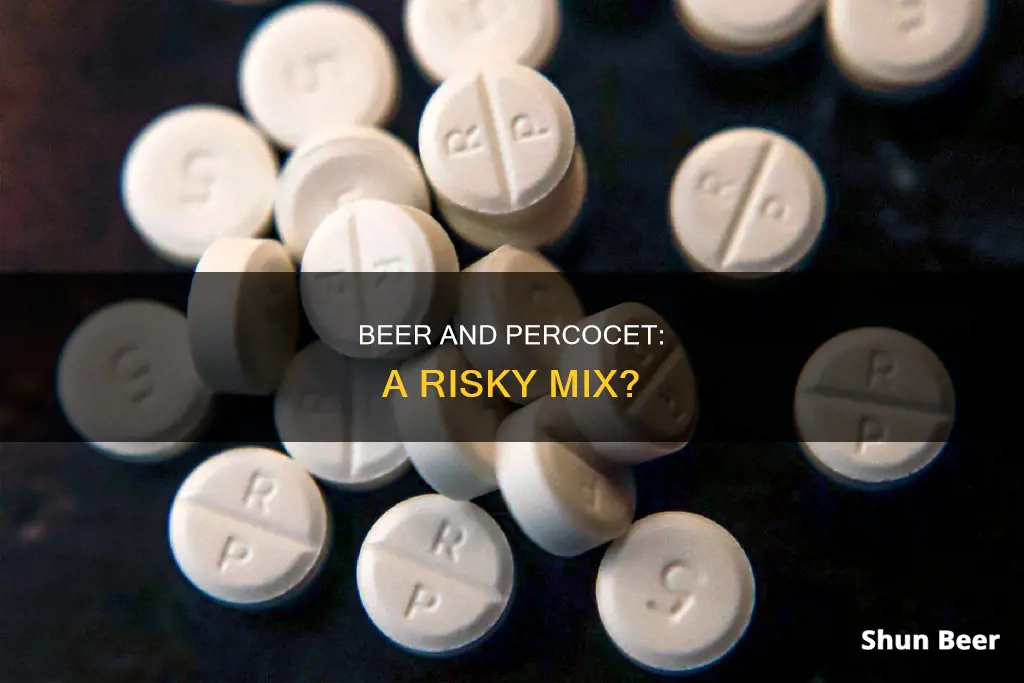
Percocet is a prescription opioid painkiller that combines oxycodone and acetaminophen. It is highly addictive and dangerous when mixed with other substances, especially alcohol. Both Percocet and alcohol slow breathing and can be toxic to the liver. When combined, they amplify each other's effects, increasing the risk of irreversible liver damage, opioid overdose, unconsciousness, slowed heart rate, respiratory failure, coma, brain damage, and death. Even a small amount of alcohol with Percocet can be lethal, and there is no safe amount to drink when taking this medication.
| Characteristics | Values |
|---|---|
| Should you drink beer on Percocet? | No, it is not safe to drink beer on Percocet. |
| Why? | It can result in severe respiratory depression, which could lead to irreversible injury and/or death. |
| What is Percocet? | A brand name for a prescription pain-relieving drug comprising acetaminophen and oxycodone, the latter of which is an opioid with a high potential for dependence and addiction. |
| What is Oxycodone? | An opioid, a chemical substance used to manufacture medications for pain relief and anesthesia. |
| What is Acetaminophen? | An antipyretic (fever reducer) and analgesic used to manage mild to moderate pain. |
| What happens when you mix Oxycodone and Alcohol? | It can slow breathing, impair judgment and coordination, and be toxic to the liver. |
| What are the side effects of mixing Oxycodone and Alcohol? | Profound sedation, decreased heart rate and blood pressure, slowed or stopped breathing, unconsciousness, coma, and potential death. |
| What are the signs of an opioid overdose? | Narrowed or pinpoint pupils, slowed or stopped breathing, loss of consciousness. |
What You'll Learn

Mixing beer and Percocet can lead to profound sedation
The effects of Percocet and alcohol can be amplified when taken together, leading to impaired judgment and coordination, and an increased risk of injury. Additionally, the risk of addiction may be heightened, as both substances stimulate the production of dopamine and serotonin, creating feelings of euphoria and relaxation. The potential for hepatotoxicity (liver poisoning) is also increased when alcohol is added to the mix, as the enzyme that breaks down acetaminophen also breaks down alcohol, leading to a higher risk of liver injury.
The dangers of mixing beer and Percocet are significant, and it is essential to follow the directions provided by a doctor or pharmacist when taking prescription medications. It is crucial to avoid consuming alcohol while taking Percocet, even if the effects of the medication seem to have worn off, as this can still lead to dangerous interactions and side effects.
The side effects of mixing alcohol and Percocet can be severe and life-threatening, and it is important to seek immediate medical attention if an overdose is suspected. Symptoms of an opioid overdose include unconsciousness, slowed or ragged breathing, constricted pupils, nausea, vomiting, and pale or gray skin. It is crucial to prioritize one's health and well-being by avoiding the combination of beer and Percocet.
Drinking Beer at Foroya Bjor: What's the Deal?
You may want to see also

It can cause respiratory failure
Mixing alcohol and Percocet can have serious and even fatal consequences. Both alcohol and Percocet can slow breathing, impair judgment and coordination, and be toxic to the liver. These effects are amplified when the two are combined.
Oxycodone, the opioid in Percocet, is a central nervous system depressant. It slows down a person's breathing and can affect balance, coordination, and reflexes. It can also cause impaired memory, judgment, and concentration. When mixed with alcohol, a central nervous system depressant with similar effects, these effects are amplified, and the risk of respiratory failure increases.
Respiratory failure occurs when the respiratory system is overwhelmed and can no longer function properly. This can lead to suffocation, as breathing slows or stops altogether. Without immediate medical treatment, oxygen deprivation can cause irreversible brain damage and even death.
The combination of alcohol and Percocet can also increase the risk of liver damage. Acetaminophen, one of the components of Percocet, is already mildly toxic to the liver. When alcohol is added to the mix, the potential for hepatotoxicity (liver poisoning) increases. This is because the same enzyme that breaks down acetaminophen is also responsible for breaking down alcohol. As a result, more of the active drug remains in the bloodstream, increasing the risk of liver injury and permanent liver damage.
In conclusion, mixing alcohol and Percocet can cause respiratory failure by overwhelming the respiratory system and slowing or stopping breathing. It also increases the risk of liver damage by raising the levels of toxic substances in the bloodstream. Therefore, it is strongly advised to avoid mixing alcohol and Percocet to prevent these potentially fatal consequences.
Beer and Steroid Shots: Safe Mix or Health Risk?
You may want to see also

It can lead to an increased risk of addiction
Mixing alcohol and Percocet can lead to an increased risk of addiction. Both alcohol and Percocet, a prescription opioid, can slow breathing, impair judgment and coordination, and be toxic to the liver. These risks are amplified when the two are combined.
Oxycodone, the opioid component of Percocet, and alcohol both stimulate the production of the "feel-good" hormones dopamine and serotonin, causing feelings of euphoria and relaxation. Over time, the brain's reward center becomes less responsive to these substances, requiring higher doses to achieve the same effects. This can lead to addiction, as users seek to replicate the initial pleasurable feelings.
Alcohol use has been shown to increase the likelihood and severity of opioid addiction. Additionally, there is evidence that those who abuse both alcohol and opioids are less likely to respond to substance abuse treatment. The combination of the two substances can also amplify the intoxicating effects, leading to impaired coordination and judgment, and an increased risk of accidental injury.
The risk of addiction is further heightened by the potential for accidental overdose when mixing alcohol and Percocet. An opioid overdose occurs when opioid receptors in the brain are overstimulated, leading to a decrease in vital functions, particularly breathing. When combined with alcohol, the risk of respiratory depression, or slowed breathing, increases significantly. This can lead to unconsciousness, slowed heart rate, respiratory failure, coma, brain damage, and even death.
The potential for liver damage is another concern when mixing alcohol and Percocet. Acetaminophen, one of the components of Percocet, can cause liver injury when consumed in high doses. When alcohol is added to the mix, the risk of hepatotoxicity, or liver poisoning, increases. This is due to the competition for the enzyme CYP2E1, which is responsible for breaking down both acetaminophen and alcohol. As a result, more of the active drug remains in the bloodstream, increasing the risk of liver injury and potential permanent liver damage.
Beer and Anastrozole: What You Need to Know
You may want to see also

It can cause liver damage
Drinking beer and taking Percocet is a dangerous combination that can lead to irreversible liver damage. This is because Percocet contains acetaminophen, which is known to cause liver injury, especially when consumed in high doses. When combined with alcohol, the liver struggles to metabolize both substances effectively, leading to a buildup of toxic metabolites and oxidative stress, which significantly increases the risk of liver damage.
The combination of beer and Percocet can also cause profound sedation, decreased heart rate and blood pressure, slowed or stopped breathing, unconsciousness, coma, and potential death. The risk of liver damage from mixing alcohol and acetaminophen is well-known, with over 30,000 people hospitalized each year in the United States for acute liver failure due to acetaminophen-induced liver damage.
Additionally, alcohol and oxycodone, another component of Percocet, are both central nervous system depressants. This means they slow down breathing and can lead to respiratory depression, a condition characterized by minimal or no breathing. This can quickly cause brain damage and even death if left untreated. The elderly are particularly vulnerable to this fatal outcome.
The intoxicating effects of both alcohol and Percocet can impair judgment and coordination, increasing the risk of injury, especially if operating a vehicle. Furthermore, the combination of these substances can make addiction worse and reduce the effectiveness of substance abuse treatment.
In conclusion, mixing beer and Percocet can cause irreversible liver damage and lead to a host of other serious health issues. It is crucial to avoid consuming alcohol while taking this medication to mitigate these risks.
Cemetery Drinking: Is Beer Allowed on Sacred Grounds?
You may want to see also

It can result in slowed heart rate and blood pressure
Drinking beer while taking Percocet can be extremely dangerous and even life-threatening. Both beer and Percocet are central nervous system depressants, which means they slow down parts of the brain and body. When combined, this effect is amplified, leading to a range of serious health risks.
One of the most significant risks of mixing beer and Percocet is a slowed heart rate. Both substances have the ability to slow down a person's heart rate, and when taken together, this effect is enhanced. This can lead to a shock to the cardiovascular system, increasing the risk of a heart attack or stroke.
In addition to a slowed heart rate, mixing beer and Percocet can also result in lowered blood pressure. Blood pressure is the force at which blood flows through the blood vessels. When blood pressure drops too low, it can lead to a condition called hypotension, which can be dangerous as it means that the body's organs are not getting enough oxygen and nutrients.
The combination of beer and Percocet can also cause profound sedation, decreased coordination, impaired judgment, and increased risk of addiction. However, the most serious health risk is respiratory depression, which can lead to irregular, shallow, or stopped breathing. This can quickly result in brain injury and even death if not treated immediately.
It is important to note that Percocet is intended for short-term use, usually no longer than five days. Therefore, it is recommended to simply avoid alcohol until at least 24 hours after stopping Percocet. If you or someone you know is struggling with addiction to alcohol or Percocet, it is crucial to seek professional help.
Antabuse and Alcohol: Why Drinking Beer is Risky
You may want to see also
Frequently asked questions
No, it is not safe to drink beer or any other type of alcohol while taking Percocet. Mixing alcohol and Percocet can be dangerous and lead to serious health risks, including severe respiratory depression, slowed heart rate, and liver damage.
Both alcohol and Percocet (which contains oxycodone) are central nervous system depressants that slow down breathing and have toxic effects on the liver. When combined, these effects are amplified, increasing the risk of respiratory failure, heart attack, coma, and even death.
Even if you no longer feel the effects of Percocet, there may still be some of the drug in your system. Drinking alcohol with Percocet in your system can still lead to dangerous side effects and increase the risk of impaired coordination and injury.
Alcohol can be detected in the blood up to 12 hours after consumption. It is not recommended to drink beer or any other type of alcohol before or after taking Percocet, as the combination can still have serious consequences.
If you are having trouble with Percocet or any other prescription medication, it is important to consult your doctor or pharmacist. Do not take alcohol with Percocet or any other medication without first seeking medical advice.







